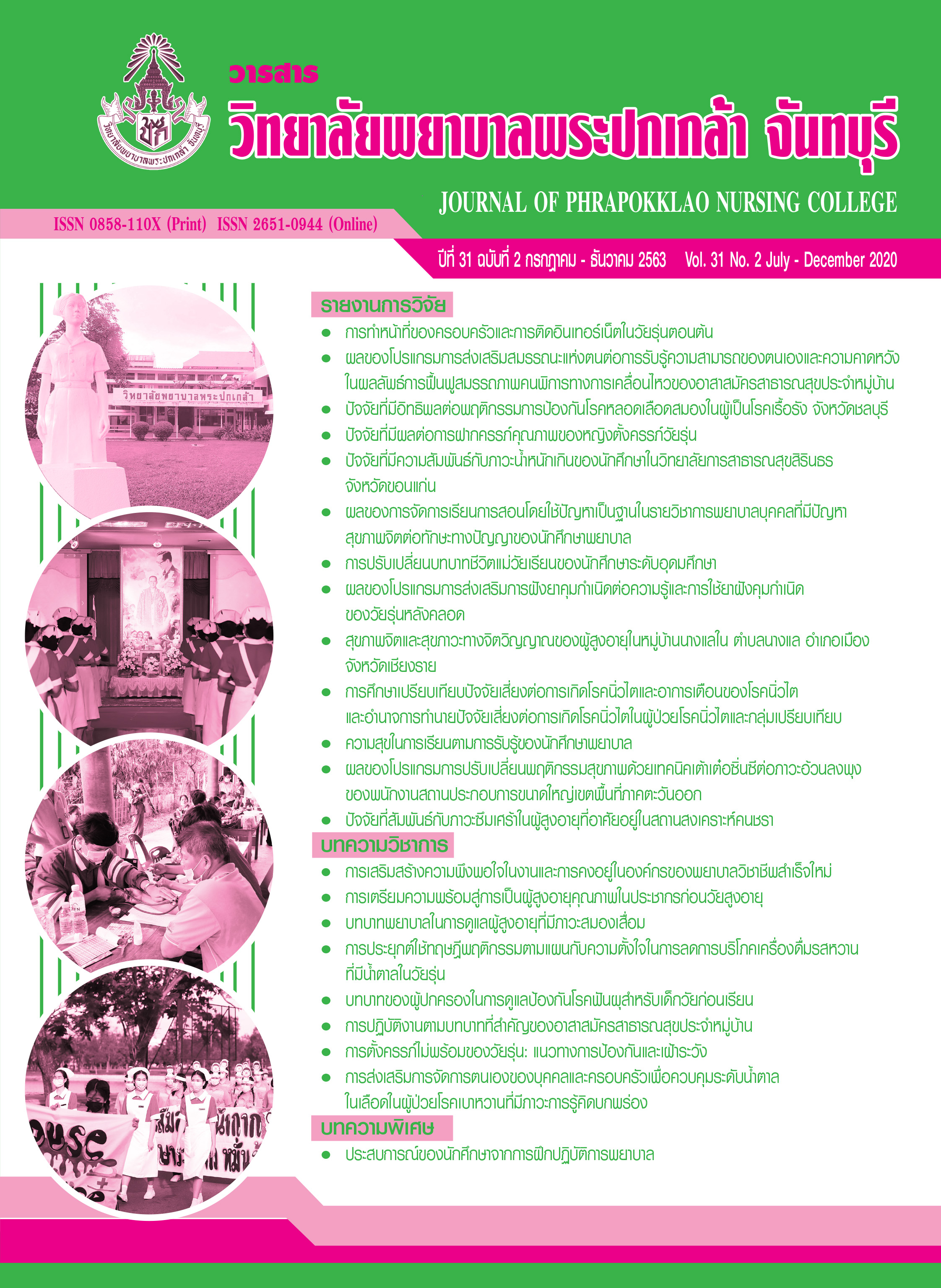Nurse’s Roles in Caring for Elderly with Dementia
Keywords:
Dementia, Older person, Nurse’s roleAbstract
Dementia is one of the major health problems for elderly around the world including Thailand. Older persons with dementia have both physical and mental health effects, including some problems in their activities of daily living up to disability in self-care and need for caregivers. Therefore, the diagnosis of dementia in older persons is the key guide for appropriate medical care. Nurses are healthcare providers who play an important role in the observation, evaluation and reporting signs of dementia in older persons, caring for older persons with dementia, and supporting caregivers in their promoting health conditions for the quality of life in older persons. This is because nurses are likely to have established a therapeutic relationship with older persons with dementia and their families. Therefore, nurses perform health assessment activities, assess the knowledge and understanding of care and impact management. In addition, nurses offer the appropriate approaches of caring for older persons with dementia and their families, as well as provide an effective conversation to reduce anxiety when they face the problems.
References
กองการพยาบาลสาธารณสุข สำนักอนามัย. (2557). คู่มือการดูแลผู้สูงอายุกลุ่มติดบ้าน สำหรับผู้ดูแล. สืบค้นจาก http://online.pubhtml5.com/gxnm/oati/
ชนิษฐา ตียะพาณิชย์, สุขเจริญ ตั้งวงษ์ไชย, และจิรภา แจ่มไพบูลย์. (2561). ความชุกและความเสี่ยงในการล้มในผู้ที่มีภาวะพุทธิปัญญาบกพร่องเล็กน้อยและภาวะสมองเสื่อม ที่คลินิกผู้ป่วยนอก โรงพยาบาลจุฬาลงกรณ์. Chulalongkorn Medical Journal, 62(5), 799–813. สืบค้นจาก http://clmjournal.org/_fileupload/journal/452-2-6.pdf
ชมรมเครือข่ายนักสื่อสารข้อมูลเชิงลึกแห่งประเทศไทย. (2562). ประเทศไทย พร้อมหรือยัง? ผู้ป่วยภาวะสมองเสื่อม เพิ่มจำนวนต่อเนื่อง ขาดความเข้าใจ ขาดแพทย์ วิกฤติชาติ. สืบค้นจาก https://public.tableau.com/profile/maxnadul#!/vizhome/TDJ-health/Section-1
ชัชวาล วงค์สารี, และศุภลักษณ์ พื้นทอง. (2561). ภาวะสมองเสื่อมในผู้สูงอายุ: การพยาบาลและการดูแลญาติผู้ดูแล. วารสาร มฉก.วิชาการ, 22(43–44), 166–179. สืบค้นจาก https://he01.tci-thaijo.org/index.php/HCUJOURNAL/article/view/146873
ดนุวัศ ศศิภิญโญ, ปุณฑริก ศรีสวาท, และสมรักษ์ สันติเบ็ญจกุล. (2562). ความชุกของภาวะซึมเศร้าในผู้ดูแลผู้ป่วยภาวะสมองเสื่อมที่รับการรักษาที่คลินิกโรคสมองเสื่อม ณ โรงพยาบาลจุฬาลงกรณ์. Chulalongkorn Medical Bulletin, 1(2), 177–189. สืบค้นจาก file:///C:/Users/Asus/Downloads/167312-Article%20Text-500282-1-10-20190307.pdf
ทัศนีย์ ตันติฤทธิศักดิ์. (บ.ก.). (2557). แนวทางเวชปฏิบัติ ภาวะสมองเสื่อม. กรุงเทพฯ: สถาบันประสาทวิทยา. สืบค้นจาก http://doh.hpc.go.th/data/academic/57dementia.pdf
ธวัชชัย เขื่อนสมบัติ, ศิริพันธุ์ สาสัตย์, และอารีย์วรรณ อ่วมตานี. (2561). การดูแลผู้สูงอายุที่มีภาวะสมองเสื่อมในครอบครัวโดยพยาบาลวิชาชีพ. วารสารพยาบาลทหารบก, 19(พิเศษ), 233–241. สืบค้นจาก http://www.bcnu.ac.th/research/attachments/documents/2561/2561-7.pdf
ธิติพันธ์ ธานีรัตน์, อุบุญรัตน์ ธุรีราช, บุญลือ เพ็ชรรักษ์, ปิยนุช กิมเสาว์, ขวัญชนก หงษ์ชูเกียรติ, และบุญธรรม ดีดวง. (2560). การพัฒนาเครื่องมือแบบคัดกรองภาวะสมองเสื่อมในผู้สูงอายุไทย. วารสารสมาคมจิตแพทย์แห่งประเทศไทย, 62(2), 177–186. สืบค้นจาก http://www.psychiatry.or.th/JOURNAL/62-2/09_Thitiphan.pdf
นาถชนิกา อาทะวิมล, และสุขเจริญ ตั้งวงษ์ไชย. (2561). การรับรู้ตราบาปในผู้ที่เป็นโรคสมองเสื่อมระยะแรกและผู้ดูแลในโรงพยาบาลจุฬาลงกรณ์. Chulalongkorn Medical Journal, 62(2), 223–237. สืบค้นจาก http://clmjournal.org/_fileupload/journal/406-5-10.pdf
บุษรา หิรัญสาโรจน์, วิราพรรณ วิโรจน์รัตน์, นพพร ว่องสิริมาศ, และวรพรรณ เสนาณรงค์. (2563). ปัจจัยที่มีอิทธิพลต่อภาวะซึมเศร้าในผู้ดูแลผู้สูงอายุที่มีภาวะสมองเสื่อม. วารสารสภาการพยาบาล, 35(2), 85–98. สืบค้นจาก file:///C:/Users/Asus/Downloads/209360-Article%20Text-832032-1-10-20200507.pdf
ปทุมพร สุรอรุณสัมฤทธิ์. (2558). การสื่อสารกับผู้ป่วยสมองเสื่อม. สืบค้นจาก https://www.si.mahidol.ac.th/th/healthdetail.asp?aid=1196
ปิติพร สิริทิพากร. (2557). บทบาทพยาบาลในการดูแลผู้สูงอายุที่มีภาวะสมองเสื่อมและผู้ดูแล. วารสารพยาบาล, 63(4), 12–19. สืบค้นจาก https://he02.tci-thaijo.org/index.php/TJN/article/view/47072
พัฒน์ศรี ศรีสุวรรณ. (2561). แผนการดูแลแบบองค์รวมสำหรับภาวะสมองเสื่อม. วารสารอายุรศาสตร์ มหาวิทยาลัยขอนแก่น, 4(3), 27–35. สืบค้นจาก https://med.mahidol.ac.th/nursing/ACNER/admin/file_doc/20191202092113.พัฒน์ศรี%20ศรีสุวรรณ
พาวุฒิ เมฆวิชัย, และสุรินทร์ แซ่ตัง. (2556). ผลกระทบจากการดูแลผู้ป่วยภาวะสมองเสื่อมในประเทศไทย. วารสารสมาคมจิตแพทย์แห่งประเทศไทย, 58(1), 101–110. สืบค้นจาก http://www.psychiatry.or.th/JOURNAL/58-1/09-Pawut.pdf
วิชัย เอกพลากร. (บ.ก.). (2559). การสำรวจสุขภาพประชาชนไทยโดยการตรวจร่างกาย ครั้งที่ 5 พ.ศ. 2557. นนทบุรี: สถาบันวิจัยระบบสาธารณสุข. สืบค้นจาก https://www.hsri.or.th/researcher/research/new-release/detail/7711
ศิราณี ศรีหาภาค, โกมาตร จึงเสถียรทรัพย์, และคณิศร เต็งรัง. (2556). รายงานผลการวิจัย เรื่อง ผลกระทบและภาระการดูแลผู้สูงอายุระยะยาวภายใต้วัฒนธรรมไทย. สืบค้นจาก http://164.115.27.97/digital/files/original/eccae20356e5df62398430c430a17b43.pdf
ศิริกุล การุณเจริญพาณิชย์. (2558). ผู้สูงอายุที่มีภาวะสมองเสื่อมและการพยาบาล: บทบาทที่ท้าทายของพยาบาล. วารสารพยาบาลกระทรวงสาธารณสุข, 25(1), 1–12. สืบค้นจาก https://he02.tci-thaijo.org/index.php/tnaph/article/view/36148
สนธยา มณีรัตน์, สัมพันธ์ มณีรัตน์, และทิวาวัน คำบรรลือ. (2561). การพยาบาลด้านจิตสังคมผู้สูงอายุสมองเสื่อมที่มีปัญหาด้านพฤติกรรม อารมณ์ และจิตใจ. วารสารวิจัยทางวิทยาศาสตร์สุขภาพ, 12(2), 1–9. สืบค้นจาก https://www.tci-thaijo.org/index.php/JHR/issue/download/12613/Vol12No2
สนธยา มณีรัตน์, และสุมณฑา บุญชัย. (2558). การพัฒนารูปแบบการพยาบาลด้านจิตสังคมผู้สูงอายุโรคสมองเสื่อม โรงพยาบาลสวนสราญรมย์. วารสารมหาวิทยาลัยนราธิวาสราชนครินทร์ สาขามนุษยศาสตร์และสังคมศาสตร์, 2(1), 52–62. สืบค้นจาก https://so05.tci-thaijo.org/index.php/pnuhuso/article/view/53508
สำนักงานกองทุนสนับสนุนการสร้างเสริมสุขภาพ. (2562). พัฒนาระบบการดูแลผู้ป่วยสมองเสื่อมครบวงจร. สืบค้นจาก https://www.thaihealth.or.th/Content/49850.html
อุไร ยิ้มแย้ม, และณรินี แย้มสกุล. (2556). การคัดกรองภาวะสมองเสื่อมเบื้องต้นของผู้สูงอายุในอำเภอดำเนินสะดวก จังหวัดราชบุรี. วารสารสุขภาพภาคประชาชน, 9(1), 29–37. สืบค้นจาก http://phc.moph.go.th/www_hss/data_center/ifm_mod/nw/9-1-56.pdf
Brodaty, H., & Donkin, M. (2009). Family caregivers of people with dementia. Dialogues in clinical. Neuroscience, 11(2), 217–228. Retrieved from http://europepmc.org/article/MED/19585957
Cooper, C., Balamurali, T. B. S., & Livingston, G. (2007). A systematic review of the prevalence and covariates of anxiety in caregivers of people with dementia. International Psychogeriatrics, 19(2), 175–195. Retrieved from https://www.researchgate.net/publication/6789680
Fischer, C. (2004). Delusion in Alzheimer’s disease: A literature review. The Canadian Alzheimer Disease Review, 7(1), 11–15. Retrieved from http://www.stacommunications.com/customcomm/Back-issue_pages/AD_Review/adPDFs/april2004e/AD%20Review-April%202004.pdf
Jenkins, C., Ginesi, L., & Keenan, B. (2016). The Nurse’s role in caring for people with dementia. Nursing Times, 112(27/28), 20–23. Retrieved from https://www.researchgate.net/publication/306291423_
Jurczak, W., Porzych, K., & Polak-Szabela, A. (2014). Nurse’s role in taking care of a patient with Alzheimer’s disease. Medical and Biological Sciences, 28(2), 5–10. Retrieved from http://dx.doi.org/10.12775/MBS.2014.014
Kitching, D. (2015). Depression in dementia. Australian Prescriber, 38(6), 209–211. Retrieved from https://www.ncbi.nlm.nih.gov/pmc/articles/PMC4674029/pdf/austprescr-38-209.pdf
Prince, M., Wimo, A., Guerchet, M., Ali, G-C., Wu, Y-T., & Prina, M. (2015). World Alzheimer report 2015. The global impact of dementia. An analysis of prevalence, incidence, cost and trends. London: Alzheimer’s Disease International (ADI). Retrieved from https://www.researchgate.net/publication/281555306_
Reed-Guy, L. (2018). The stages of dementia. Retrieved from https://www.healthline.com/health/dementia/stages
Schulz, R., Belle, S. H., Czaja, S. J., McGinnis, K. A., Stevens, A., & Zhang, S. (2004). Long-term care placement of dementia patients and caregiver health and well-being. JAMA, 292(8), 916–967. Retrieved from https://pubmed.ncbi.nlm.nih.gov/15328328/
Wilson, R., Gilley, D., Bennett, D., Beckett, L., & Evans, D. (2000). Hallucination, delusions, and cognitive decline in Alzheimer’s disease. Journal of Neurology Neurosurgery & Psychiatry, 69(2), 172–177. Retrieved from https://jnnp.bmj.com/content/jnnp/69/2/172.full.pdf
World Health Organization. (2019). Dementia. Retrieved from https://www.who.int/news-room/fact-sheets/detail/dementia
Downloads
Published
How to Cite
Issue
Section
License
Copyright (c) 2020 JOURNAL OF PHRAPOKKLAO NURSING COLLEGE

This work is licensed under a Creative Commons Attribution-NonCommercial-NoDerivatives 4.0 International License.
เนื้อความ ข้อมูล และรายการอ้างอิงที่ผู้เขียนใช้ในการเขียนบทความเพื่อลงตีพิมพ์ในวารสารวิทยาลัยพยาบาลพระปกเกล้า จันทบุรี ถือเป็นความคิดเห็นและความรับผิดชอบของผู้เขียน คณะผู้จัดทำวารสารไม่จำเป็นต้องเห็นพ้องด้วยหรือร่วมรับผิดชอบ
บทความที่ได้รับการลงตีพิมพ์ในวารสารวิทยาลัยพยาบาลพระปกเกล้า จันทบุรี ถือเป็นลิขสิทธิ์ของวารสารวิทยาลัยพยาบาลพระปกเกล้า จันทบุรี หากหน่วยงานหรือบุคคลใดต้องการนำส่วนหนึ่งหรือทั้งหมดของบทความไปเผยแพร่ต่อเพื่อวัตถุประสงค์ใด ๆ จะต้องได้รับอนุญาตจากบรรณาธิการวารสารก่อน



